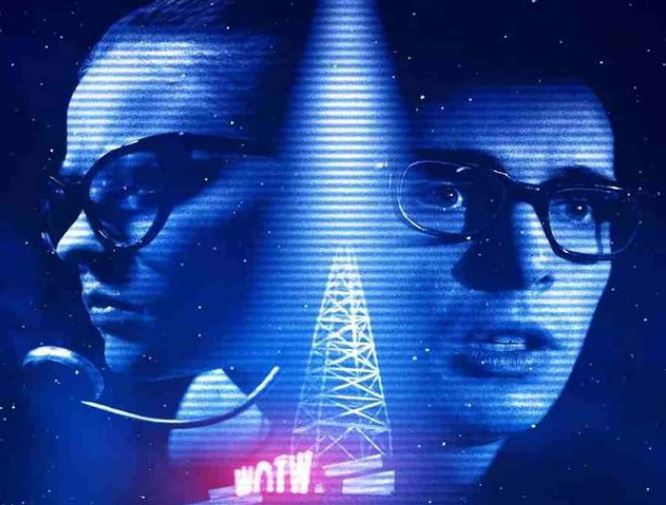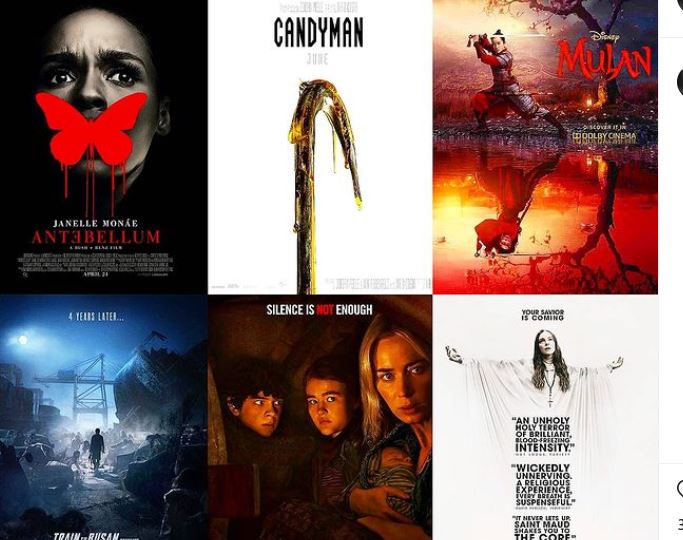Selection of the best movies of the year to see in theaters, Netflix, HBO, Amazon Prime.
20. THE INCREDIBLE STORY OF DAVID COPPERFIELD
By Armando Iannucci
Suddenly, Charles Dickens takes on the texture of the new, of the yet to be discovered. Armando Iannucci achieves the most heterodox, free and modern of the readings of the classic with the non-artificial exercise of orthodoxy, but well understood. It is about understanding and making visible that respect for the text has nothing to do with wearing a tie properly or a suit that has just been ironed. Fidelity goes inside. Delusional, deep, happy and bright.
19. LITTLE JOE
By Jessica Hausner
On an argument more typical of science fiction, the film tells the story of a flower capable of causing its caregivers to want to live. To live well, of course. Halfway between Siegel’s Invasion of the Body Snatchers and Shyamalan’s The Incident , the story progresses pinpoint and precise through consciously and ironically explored territories. Nothing is new, even though everything is seen for the first time. Or vice versa.
18. CORPUS CHRISTI
By Jan Komasa
Lit by a rare, almost mystical hyper-realism (all the characters sport blue eyes) and a dazzling gray photography (notable for the work of Piotr Sobocinski), the film does not hesitate to descend into the most obvious of the mud to teach us the true meaning of the sacred. The one that is announced as the Polish candidate for the Oscar wants to be the slow narrative of what is nothing more than an error, a confusion, a tangle of identities that puts into question, attentive, the very concept of goodness. And so.
17. DON’T THINK I’M GOING TO SCREAM
By Frank Beauvais
This movie is worth as a symptom. Beauvais tells the story of a man alone and locked in his house. So alone and locked up like so many others during confinement. Our hero only does one thing: watch movies and with fragments of everything he sees recompose his story and that of everyone. It is a short-cut film that elevates metafiction to the category of religion. It is cinema as salvation. And as a sentence. It is the sign of times that are definitely ending.
16. BLISS
By Joe Begos
Suddenly a vampire tale as close to Panos Cosmatos as it is to Claire Denis. Dirty, bloody, obsessive, schizophrenic and fundamentally electric. The director finds the exact place and the correct way to treat his nervousness. And his undoubted talent. Between ‘ giallo ‘ and abstraction, between terror and melodrama, Begos succeeds in making a hypnotic fable about art, the power of creation and the simple emptiness. It’s about liquid cinema, a psychedelic feast of blood, adrenaline, oil paint and even semen. It was Lady Macbeth who maintained that every time a man acts a liquid spills. Well that. And also stain.
15. ABOUT INFINITY
By Roy Andersson
The worst thing is not the absurdity of all this. The worst thing is that, in addition, it is infinite, it never ends. Come on, it doesn’t even happen fast. On this precept, the Swede Andersson has long been determined to dig a huge hole. ‘ On infinity ‘ can be understood as an epilogue to his particular trilogy of existence that closed with ‘A dove perched on a branch to reflect on existence’. Again, the characters with their faces erased by white chalk; again, the perfect composition (or decomposition) of a world placed between reality and the same dream;as always, a script that leaves between the gaps of the words the very possibility of expression. Suddenly, a universe tragic in its humor or hilarious in total absence of prejudice.
14. THE WILD GOOSE LAKE
By Diao Yinan
Diao Yinan reconfigures ‘ noir ‘ in exactly the same terms as in her previous work ‘Black coal’ , the film that won the Golden Bear in Berlin in 2014. Once again, the night is the scene of the dream of a disproportionate city that behaves, moves and crawls like a wild animal. The director saturates the screen with everything that determines the tragedy of a man. In the nightmare reconstructed by Yinan, it rains, bodies open to the path of razors, and prostitutes empty themselves on the opaque surface of the lakes.
13. SAINT MAUD
By Rose Glass
Horror cinema acquires in this first feature the character of the irrefutable, the overwhelming, the tremendous. The story of a nurse ready to do anything to save the sick soul of the woman she cares for acquires in the hands of Rose Glass the character of an initiatory tale that reformulates issues such as the power of faith from the ground up or, one step further there, the strategies of domination and submission of the patriarchy. Obsessive beyond exhaustion.
12. VITALINA VARELA
By Pedro Costa
The journey of a woman from Cape Verde to Lisbon in search of the corpse of her husband, who long ago emigrated, becomes in the hands of Maestro Costa a wounded canvas of deep chiaroscuro behind Vitaliana’s pain. The entire film sleepwalks through a feeling close to orphanhood. So intense and deep that one would say a state of the soul or simply an indissoluble condition of one’s existence. A cinematographic miracle with the certainty of light, dense light .
11. EMA
By Pablo Larraín
From the hand of the enigmatic Mariana Di Girolamo, the Chilean director makes a film completely free of arguments, excuses or learned gestures. All ‘ Ema ‘ navigates without ties through her most intimate secret, through a mystery tied to bodies that offer themselves virgins to everything and everyone: pain, pleasure, sex and dance. Yes, you dance non-stop for the same reason you live and, above all, you fuck, for the simple inertia offered by the principle of vitality that moves everything. It is sensory cinema, feverish and very danceable.
10. THE VAST OF NIGHT
By Andrew Patterson
 The modern world is the child of suspicion. Marx, Freud and Nietzsche demonstrated that after the evidence the monster breathes. And Andrew Patterson insists on ‘The Vast of Night’ to make it clear that, now more than ever, paranoia defines us. His film is a rare nocturnal artifact that pays homage to intriguing jamming television and shows like ‘ The Twilight Zone’, while bringing us back to the naivety of old radio and those flying saucer aliens. Without a doubt, one of the most glorious and magnetic surprises of the platform premieres. It overwhelms the ability to restore the fever of suspicion Now that we are so vulnerable.
The modern world is the child of suspicion. Marx, Freud and Nietzsche demonstrated that after the evidence the monster breathes. And Andrew Patterson insists on ‘The Vast of Night’ to make it clear that, now more than ever, paranoia defines us. His film is a rare nocturnal artifact that pays homage to intriguing jamming television and shows like ‘ The Twilight Zone’, while bringing us back to the naivety of old radio and those flying saucer aliens. Without a doubt, one of the most glorious and magnetic surprises of the platform premieres. It overwhelms the ability to restore the fever of suspicion Now that we are so vulnerable.
9. UNDER THE SKIN
By Jonathan Glazer
In reality, the angry and carnal proposal starring the voracious alien Scarlett Johansson was released in the wide world in 2013. And even for that, the 2020 that ends is rare, capable of turning into eternal material a cult object of the past. Each scene of ‘ Under the skin’ runs across the screen close to the hallucination supported by the music of Mica Levi that works as if giant nails scratch the slate of the universe. The metaphor is of the composer. A kind of camera obscura submerges bodies in a black fluid that could well be blood from other worlds.Scarlett strips naked and offers herself entirely as Venus; gets naked for the first time and only. It does so while punishing and condemning the gaze and, with it, those who gaze. It is a perfect cold nude; as perfect and icy as a knife that refutes both desire and eroticism itself.
8. BORAT, MOVIE FILM SEQUEL
By Jason Woliner
Sacha Baron Cohen returns. And he does it in a big way. He’s no funnier now than he was 15 years ago, the reality is just more ridiculous. Our contemporary hero walks his indomitable stupidity through a crazy universe that has definitely lost its way. The novelty, yes, is the responsibility of the actress Maria Bakalova, who, rather than simply following the rhythm, doubles it. To say that his role borders on genius is hardly saying anything. Is better. She simply offers herself submissive to a terribly macho universe. If Borat’s simplicity was the best excuse for issues such as racism, xenophobia, classism, brother-in-law or homophobia to be seen, now it is Bakalova’s naivety that adds another notch to the ‘hit parade’: heteropatriarchal rigor bleeds, literally, with her.
7. I’M THINKING OF QUITTING
By Charlie Kaufman
The most risky, ‘Borgian’, and meta-screenwriter of film writers, he composes one of the most abrasive wonders that the pandemic has left. The director of ‘How to be John Malkovich’, ‘Anomalisa’ and ‘Synecdoche, New York’ now shows his most bitter, sad, taciturn and, let’s face it, arrogant profile. Not only is it a film about issues such as the wounds of love, it is also about memory, identity and dreams. From ‘The Golden Age’ of Bunuel’s surrealist film he had not dared to so much. Netflix leaves creators complete freedom and this happens. A miracle. Very painful, but a miracle after all.
6. NEVER, ALMOST NEVER, SOMETIMES, ALWAYS
By Eliza Hittman
A teenage couple travel to the city with one goal: to have an abortion. The director turns this minimal plot into an authentic and superb journey to the depths of the night, into a naturalistic, melancholic and stark drama about the harassed adolescence. With unusual precision, Hittman manages to compose a rare, absent, and very deep symphony of pain. The photograph between saturated and only broken, the necessarily fractured soundtrack and the gaze broken into pieces make up a universe of rubble, strange and very close at the same time.
5. SOUL
By Pete Docter, Kemp Powers
What’s new from Pixar is once again the most genuine of the last Pixar in the post-Lasseter era. And Peter Docter, the genius behind ‘ Up ‘ and ‘ Backwards’, insists on precisely combining pop (or rather jazz) delirium with gentle abstraction to craft a gleefully Cartesian work of Descartes. But no offense. It is told in ‘ Soul ‘ the difficult dual relationship between that ghostly entity that, according to the French philosopher, lived in the pineal gland – call it the soul – and the machine of cells with a certain tendency to gain weight – also known as the body. What follows is a delicate, precise, fun, immersive and very emotionalvindication of what time and the lack of adequate definition have come to call life. Or cinema, how much does it matter.
4. MANK
By David Fincher
In a black and white studied close to reverie or nightmare, Fincher reformulates ‘ Citizen Kane ‘ from the opposite side of the mirror, from the broken life of the screenwriter dipsomaniac Hermann J. Mankiewicz. In a prodigious loop, the viewer is invited not so much to enter the ‘ making of’ of the film that blew up the narrative codes of classic cinema, as to unweave and reweave the same story from the point of view opposite. If Kane’s was the story of the most powerful and arrogant of men confronted with the power machinery created by himself, Mank’s is the story of the smallest of beings that he contemplates from his insignificance the ravages of a time essentially unjust and condemned to disappear.
3. TENET
By Christopher Nolan
Nolan rediscovers the virtue of wonder for film. The whole film is based on the most elementary of the tricks that the cinematographer discovered for himself: the possibility of making time run backwards. In the same way that the train enters the Ciotat station, it is enough to turn the crank in the opposite direction to see it return to its place of origin, which, suddenly, is the destination. And on that almost sacred precept, the director insists on his temporary obsessions to compose a prodigious puzzle where everything, incredible as it may seem, fits down to the last and most explosive detail. It’s cinema that goes boom! and leaving neither prisoners nor wounded.
2. THE LIGHTHOUSE
By Robert Eggers
We no longer remember, but the year, when we still did not know anything about Covid, started with a wave, a tsunami, the better. Rather than simply a movie, the new proposal from the director of ‘ The Witch ‘ is a cathartic, dirty and feverish experience. Each blow of the sea soaks, each stab wounds, the wind naked … A masterpiece with the stench of saltpeter with Willem Dafoe and Robert Pattinson delivered to a delirium through which they parade weightless, whole and naked from Melville to Poe passing through the corpses Uncorrupted Captain Ahab and Aleister Crowley. All of them observed by the eye of a lighthouse that points to the deepest part of the viewer’s retina.
1. BEGINNING
By Dea Kulumbegashvili
After sweeping the San Sebastián Film Festival, where it won four of the biggest awards ( Concha de Oro , direction, script and actress for Ia Sukhitashvili), the film by the debutant Dea Kulumbegashvili has become the best excuse to save a year whole; an unfortunate season without Cannes and with the list of premieres reduced to exhaustion. Disturbing, elegant, brutal and hypnotic , the film navigates with conviction through reality suddenly turned into a dream. Maybe just nightmare. It is cinema that subjugates with the same force that it puts on the alert. It is cinema for interrogation, investigation and even doubt. It is cinema, which in its somnambulous and magnetic appearance aspires to revolutionize everything. It is the best of the year, it is clear.

